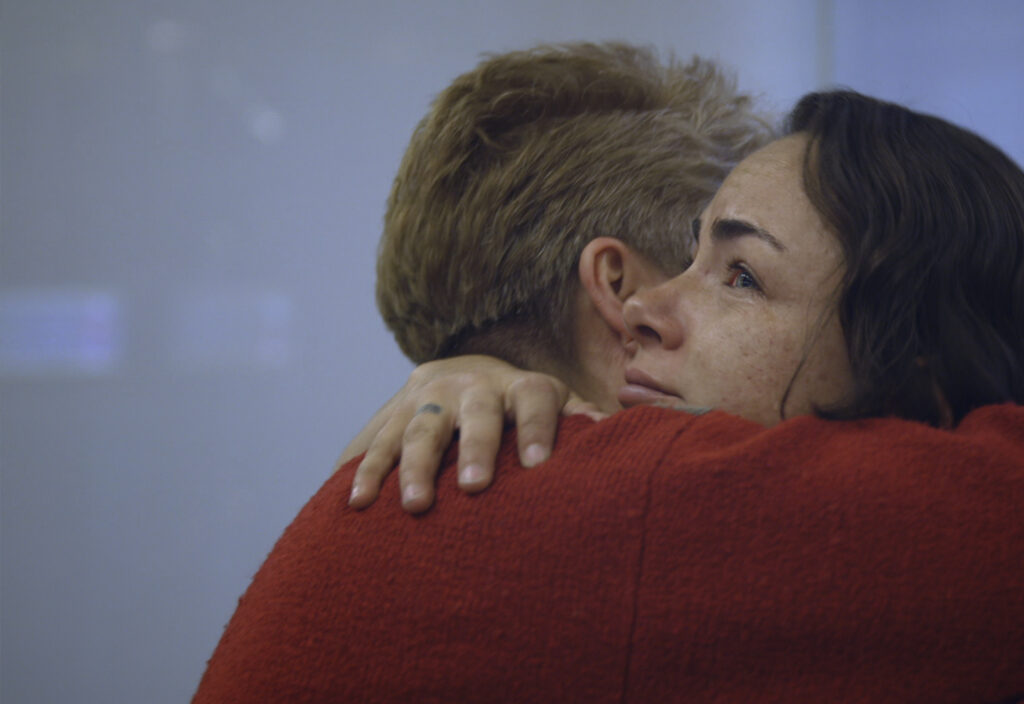A Colombian Family (Tanja Wol Sørensen, 2020) charts the difficult relationship of Yira and her politically-active mother Ruby against the backdrop of the conflict between the FARC rebel movement and the government in Colombia. Ruby is faced with a tough dilemma as Yira pleads with her to leave Colombia, a decision which would mean abandoning the struggles of her people. Compelling and engaging, this documentary illustrates that the political is never separable from the personal.
The film opens with Yira and Ruby poring over family photo albums, Yira claiming not to know several relatives. Far from inducing nostalgia and happy memories, this activity leads Yira to divulge her resentment and feelings about her troubled childhood, which Ruby denies. This immediately establishes the charged nature of their relationship. Everyday arguments provoked by Yira leaving a towel on the floor and Ruby’s disapproval of Yira’s smoking are shown alongside deep disputes about Yira’s perception of her childhood and Ruby’s stubborn refusal to leave Colombia, illustrating that the rift between the pair is far greater than the usual tensions of a mother-daughter relationship.

Yira and Ruby’s constant disagreement acts as a microcosm for the apparently never-ending political tensions in Colombia. News channels and radio shows discussing the conflict frequently provide background noise and Ruby’s phone is constantly buzzing with communications from other activists. Despite the peace treaty between the rebels and the government, news of killings of social leaders are a nearly everyday occurrence in Ruby’s life, as well as the death threats she receives. The announcement of the results of an election are met with cries of ‘fraud!’ despite a supposed 72.64% majority. Shots of intense natural phenomena – an angry red sky, pounding rain, a seemingly infinite lake, crashing waves – speak to these rising tensions.
The impact that the political situation has had on Yira and Ruby’s lives is depicted with brutal rawness, providing context for Ruby’s resistance to injustice. Ruby’s father recounts the burning of his house by paramilitaries, and archival footage follows illustrating that there were fatalities. He is shown in medium close-up, his eyes brimming with tears. Ruby describes the traumatic kidnapping and sexual assault she endured, similarly framed in medium close-up looking to camera. The murder of Yira’s father haunts the film. Yira’s ritual of running water around the rim of a glass and lighting incense to “communicate” with him points to her intense grief.
However, despite the circumstances and their different feelings about how to respond, Yira and Ruby’s love for one another is undying. The pair are seen joyfully celebrating Ruby’s birthday with Yira’s daughter and later hosting a Christmas party. The film ends with a shot of the pair embracing as they look contemplatively out to sea on Ruby’s last day visiting Yira in Cuba. Ultimately their disagreements are born out of love: Yira wishes her mother to leave Colombia for her own safety while Ruby resists abandoning her work due to her ardent love for the Colombian people.
In A Colombian Family Tanja Wol Sørensen deftly weaves a profound story of love in the face of adversity and shines a light on the emotional cost of political conflict.